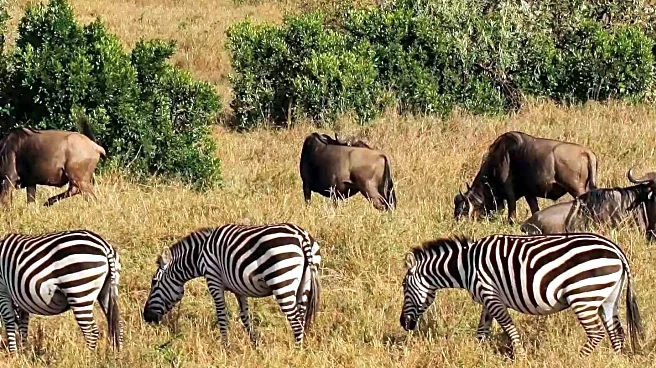What is the story about?
What's Happening?
Chris Fallows, renowned for his iconic photograph of a great white shark breaching in False Bay, has shifted his focus from marine conservation to land rewilding in Africa. After witnessing the disappearance of great white sharks from False Bay, attributed to factors like predatory killer whales and human activities such as overfishing, Fallows and his wife Monique decided to invest in land conservation. In 2017, they purchased 25 hectares of land on South Africa's south coast, using proceeds from Fallows' fine art photography. The land was cleared of invasive species, leading to a resurgence of native flora and fauna. Inspired by their success, neighboring landowners have joined the effort, expanding the conserved area to 1,500 hectares. Fallows is now acquiring a 10,000-hectare property in Namibia, aiming to create one of Africa's largest privately owned wildlife reserves.
Why It's Important?
Fallows' initiative highlights the critical role of private conservation efforts in preserving biodiversity. By transforming degraded land into thriving ecosystems, these projects can counteract the negative impacts of human activities on wildlife. The expansion of conserved areas not only benefits local flora and fauna but also supports broader ecological networks, facilitating natural animal migrations. This approach can serve as a model for conservationists worldwide, demonstrating how private individuals can contribute significantly to environmental preservation. The potential creation of a vast wildlife reserve in Namibia could provide a sanctuary for endangered species, including cheetahs and black rhinos, and help restore populations of lions and desert elephants.
What's Next?
Fallows plans to collaborate with neighboring landowners and local organizations to establish extensive migration corridors for wildlife. The goal is to merge with other conservation landscapes, including Fish River Canyon, to create a massive reserve spanning nearly 2 million hectares. This ambitious project aims to restore habitats for charismatic wildlife and increase populations of species like brown hyenas. Fallows' vision includes the reintroduction of lions and desert elephants, which would mark a significant achievement in African conservation. The success of this initiative could inspire similar efforts globally, emphasizing the importance of private land conservation in combating biodiversity loss.
Beyond the Headlines
The rewilding efforts led by Fallows underscore the ethical responsibility of humans to restore and protect natural environments. By prioritizing ecological and biological interests, these projects challenge the traditional notion of land ownership, advocating for stewardship that benefits both nature and society. The initiative also highlights the potential for art and commerce to support conservation, as Fallows' photography sales fund land acquisitions. This innovative approach could encourage other artists and entrepreneurs to leverage their resources for environmental causes, fostering a culture of sustainability and ecological awareness.















